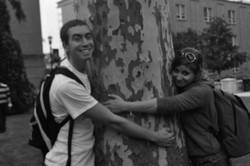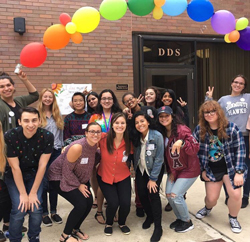Club President Zoe Shaheen Talks About the Club’s Plans for this Year
 The University’s Environmental Club was founded to establish a “growth, understanding, awareness, and appeal for environmental activism both on campus and in the community.”
The University’s Environmental Club was founded to establish a “growth, understanding, awareness, and appeal for environmental activism both on campus and in the community.”
“I have always been interested in bettering the environment and this was a perfect way for me to get involved…” said Zoe Shaheen, Club President. “Our goal is to get students involved with the environmental issues that concern us the most.”
“The Club was established to help reverse the exponential damage that humans are causing to the Earth,” said Brett Gilmartin, Club Treasurer. “I joined the Environmental Club to make a difference in protecting and preserving the environment for our own present generation and generations to come.”
The Environmental Club is currently working on installing another rain garden on campus, explained Shaheen. A rain garden is a trench in which trees, grasses and different types of deep-rooted plants are planted.
These rain gardens collect runoff water from places like parking lots and rooftops while helping to organically filter out toxins in the water.
“Rain gardens help naturally filter contaminants from runoff to replenish groundwater systems with less polluted water,” said Shaheen. The purpose of a rain garden is to help purify the bodies of water and underground system that surround it. Rain gardens are normally located near heavily polluted areas.
“They are typically found near paved lots and high traffic areas where runoff has high concentrations of contaminants and heavy metals; these factors make for optimal location,” she said. Rain gardens allow the water to slowly absorb into the ground.
The original rain garden on campus was located in the center of the commuter parking lot. When the parking lot was recon structed, the rain garden was moved to the side of the commuter parking lot, next to the athletics center. The rain garden was damaged during the move, but the Club plans to fix it so it can serve its proper function once again.
“By changing certain aspects of an entire college, a huge environmental leap can be taken and lessen the environmental footprint of Monmouth University,” said Gilmartin. On top of planting and maintaining the rain garden, the Environmental
Club has planted donated trees in the local community garden, cleaned Whale Pond Brook, and participated in a series of beach sweeps. A beach sweep is an event where participants remove litter and pollution from the shores, lakes, and rivers of a community.
The Club also holds public showings of environmental movies and has worked with multiple informative environmental tables from different companies and organizations.
“The Environmental Club is trying to promote and create a greener and healthier future,” said Gilmartin.
The Club is currently planning a series of events that will take place on campus. They are working on a series of Earthrelated projects followed by another Earth Day festival, which falls on April 22.
“Last year, the Environmental Club held an Earth Day festival for the students and members of the community. Representatives from local environmental organizations came out to support our table and the event. It was great a success and we look forward to doing it again this year,” said Shaheen.
The Club has a few small-scale events possibly taking place in the winter, but the majority of the major environmental related projects are set to debut in the spring.
The Environmental Club recently took part in the Clean Ocean Action Beach Sweep on Saturday, October 22 at 9:00 am at Pier Village.
The Environmental Club meets every Wednesday at 3:00 pm on the third floor of the Student Center.
PHOTO COURTESY of Zoe Shaheen

